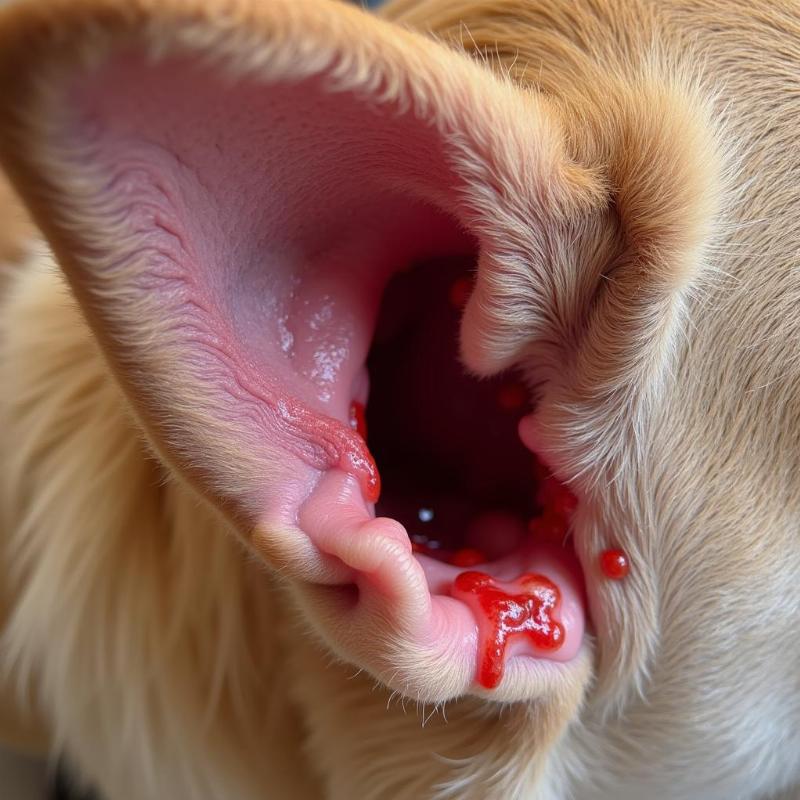Bleeding from a dog’s ear can be alarming. It’s a sign something isn’t right and needs attention. This article will guide you through the potential causes of ear bleeding in dogs, what to do if you encounter it, and how to prevent future occurrences. Let’s explore this concerning issue together to ensure your furry friend receives the best possible care.
Common Causes of Bleeding Inside a Dog’s Ear
Several factors can lead to bleeding within a dog’s ear. Some are minor, while others indicate a more serious underlying condition. Here are some of the most frequent culprits:
- Ear Infections: Chronic or severe ear infections can cause inflammation and rupture of blood vessels within the ear canal. These infections can be bacterial, fungal, or parasitic.
- Ear Mites: These tiny parasites irritate the ear canal, causing intense itching and scratching. The scratching can lead to abrasions and bleeding.
- Foreign Bodies: Grass seeds, twigs, or even small toys can become lodged in the ear canal, leading to irritation, inflammation, and potential bleeding.
- Trauma: A blow to the head, a bite from another animal, or even vigorous ear cleaning can cause trauma and bleeding within the ear.
- Aural Hematomas: These are blood-filled pockets that form between the skin and cartilage of the ear flap. They are often caused by head shaking or scratching due to underlying ear issues.
- Tumors: In rare cases, tumors within the ear canal can cause bleeding.
 Bleeding Inside Dog's Ear
Bleeding Inside Dog's Ear
What to Do if Your Dog’s Ear is Bleeding
If you notice blood inside your dog’s ear, it’s crucial to take action promptly. Follow these steps:
- Stay Calm: Although it can be distressing to see blood, remaining calm is important so you can assess the situation effectively.
- Examine the Ear: Carefully look inside the ear for any visible foreign objects, wounds, or signs of mites. Avoid probing too deeply, as this could worsen the situation.
- Control the Bleeding: If the bleeding is active, apply gentle pressure to the area with a clean gauze pad.
- Contact Your Veterinarian: Regardless of the apparent severity, it’s essential to contact your veterinarian immediately. They can diagnose the underlying cause and recommend the appropriate treatment.
Preventing Ear Bleeding in Dogs
While not all causes of ear bleeding are preventable, proactive measures can significantly reduce the risk. Consider these tips:
- Regular Ear Cleaning: Clean your dog’s ears regularly with a veterinarian-approved ear cleaner. This can help prevent the buildup of wax and debris, which can contribute to infections. salmon oil capsules for dogs can also contribute to overall ear health.
- Parasite Prevention: Use a preventative medication to protect your dog from ear mites and other parasites.
- Check Ears Regularly: Make it a habit to check your dog’s ears regularly for any signs of redness, swelling, discharge, or odor.
- Careful Grooming: Be cautious when grooming around your dog’s ears, especially when using scissors or clippers.
- Address Underlying Issues: If your dog has allergies or other conditions that predispose them to ear problems, work with your veterinarian to manage these issues effectively.
Conclusion
Bleeding inside a dog’s ear is a sign that warrants immediate attention. By understanding the potential causes, knowing what to do in such a situation, and taking preventative measures, you can help protect your furry friend’s ear health and overall well-being. Remember, consulting with your veterinarian is crucial for accurate diagnosis and treatment. Don’t hesitate to seek professional advice if you notice any signs of ear bleeding in your dog.
FAQs
- Can I use hydrogen peroxide to clean my dog’s bleeding ear? No, hydrogen peroxide can irritate the delicate tissues of the ear canal and worsen the bleeding.
- Is ear bleeding in dogs always a serious problem? Not necessarily, but it’s always best to consult a veterinarian to rule out any underlying conditions.
- How can I prevent ear mites in my dog? Use a veterinarian-recommended preventative medication, and clean your dog’s ears regularly.
- What are the symptoms of an ear infection in dogs? Symptoms include head shaking, scratching at the ears, redness, swelling, discharge, and odor.
- Can allergies cause ear bleeding in dogs? Yes, allergies can lead to inflammation and itching, which can result in scratching and subsequent bleeding. why is my dogs ear bleeding discusses this in further detail.
Related Articles
Beautdogs.us is your premier destination for all things dog-related in the US. We offer expert advice on dog breeds, care, and lifestyle, empowering you to provide the best possible care for your canine companion. Whether you’re a seasoned dog owner or just starting your journey, Beautdogs.us offers a wealth of information and resources to help you every step of the way. From understanding breed-specific needs to finding the perfect free mri scan for dogs, we’re here to support you. Contact us today for personalized guidance! Email: [email protected], Phone: +1 501-555-7529. Beautdogs.us is your trusted partner in dog ownership.